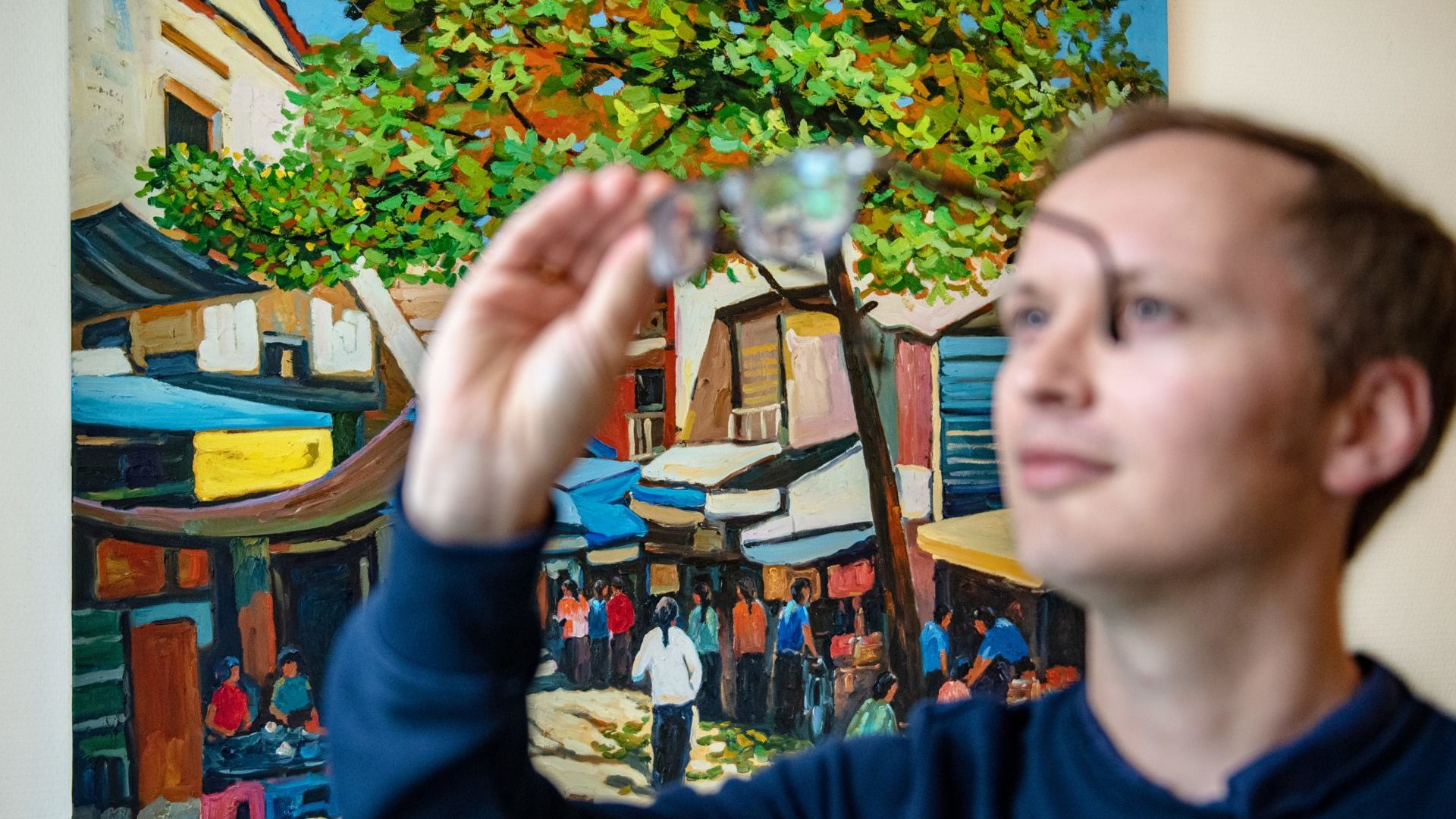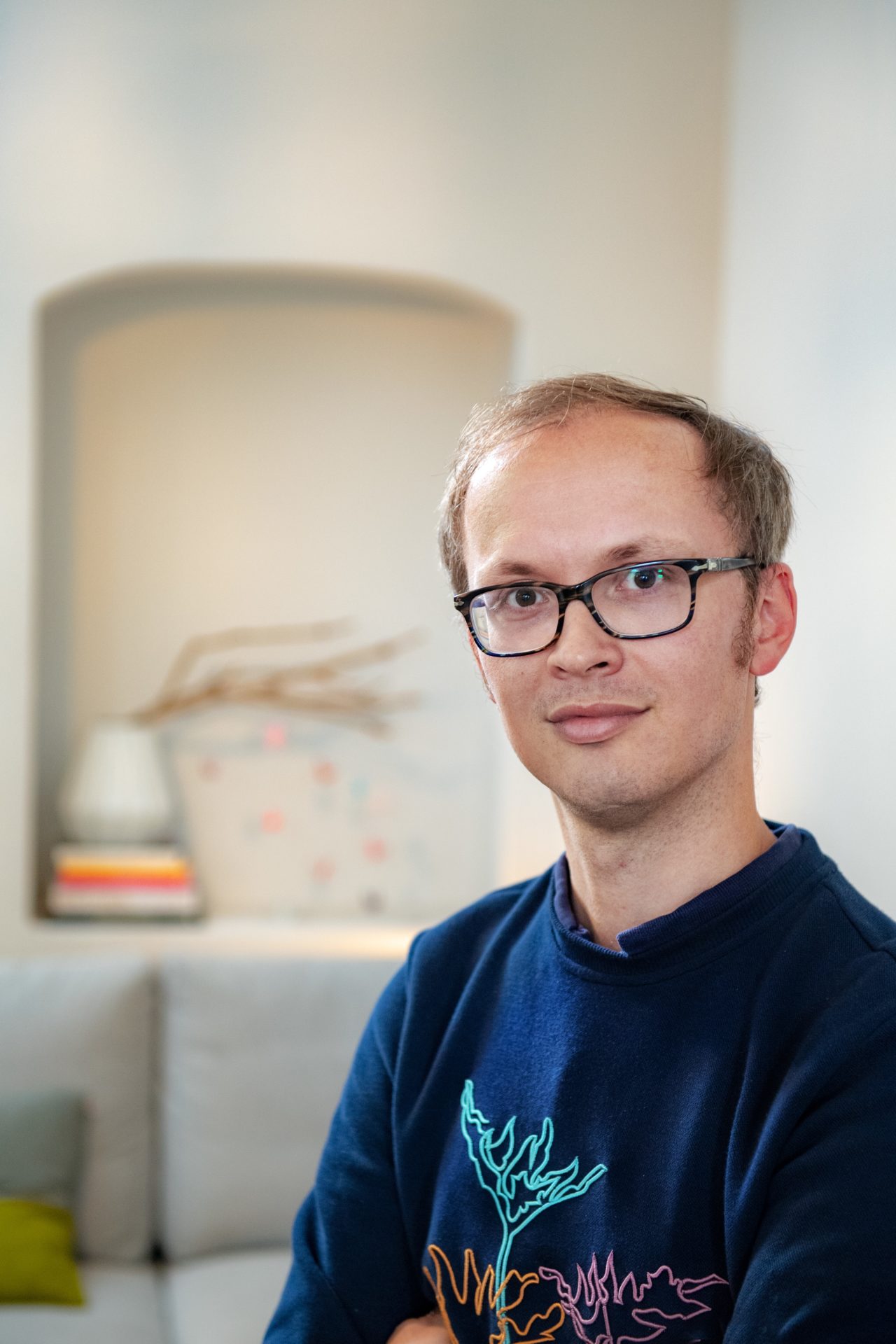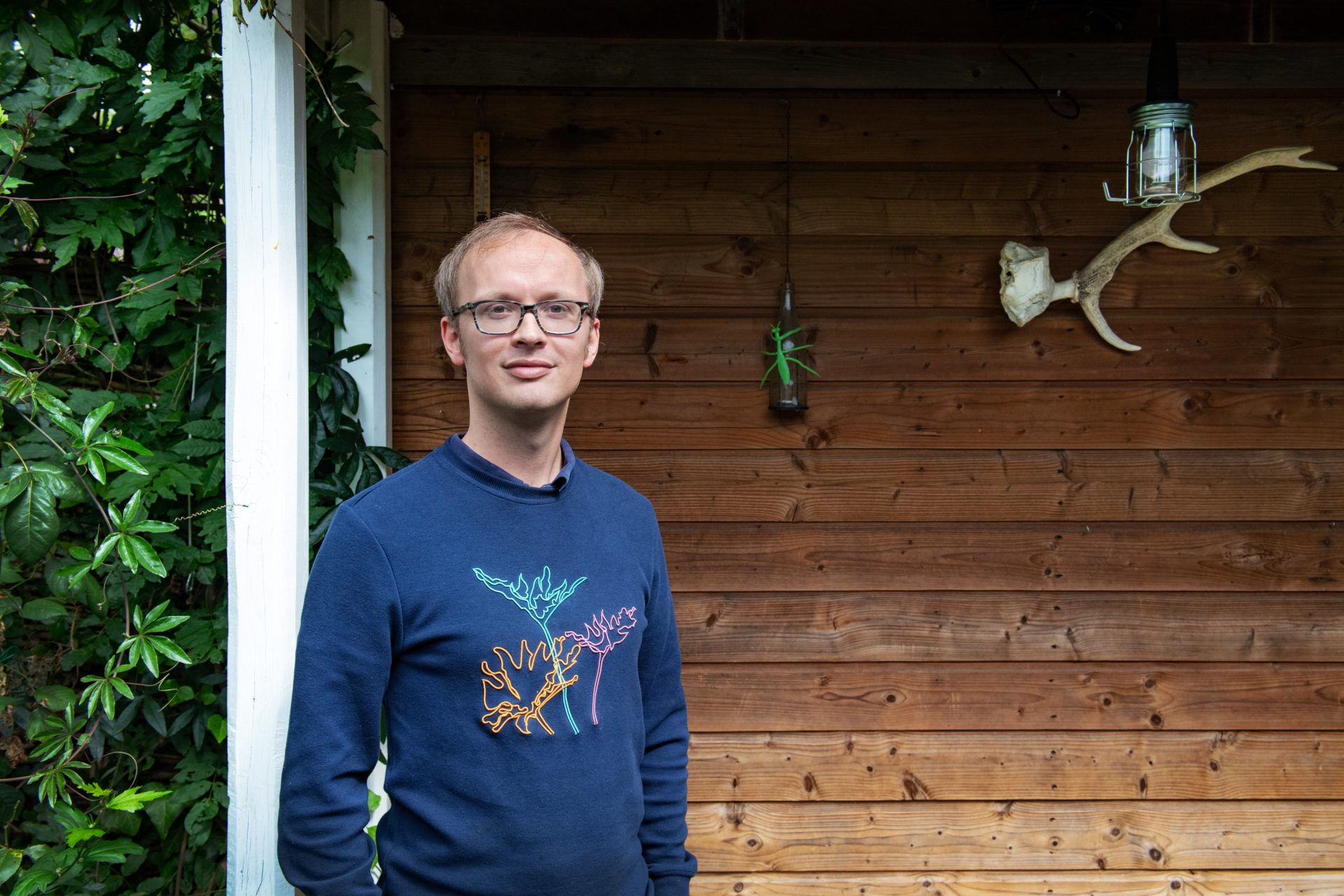Summer interview (6): ‘The human imagination knows no boundaries’
-
 Mark Dingemanse. Photo: Bert Beelen
Mark Dingemanse. Photo: Bert Beelen
He is known for his prize-winning research into filler words like “huh” and is an enthusiastic science communicator. But linguist Mark Dingemanse also has less well-known sides. He began his career in rural Africa, grew up in a religious family, and got enchanted by science through the cult book Gödel, Escher and Bach.
Language researcher Mark Dingemanse is not someone who follows the beaten path. Literally. During his PhD research, he spent a year and a half in Akpafu-Mempeasem, a village of 1200 people in eastern Ghana. It’s located in a remote mountain area, sandwiched between the large Volta Lake and neighbouring Togo. To get there, you first have to take a six-hour bus ride from the capital city of Accra on the N2 – a bumpy provincial road – and then take a dirt road just above the regional centre of Hohoe. Mobile phone masts and billboards are the direction indicators. The last stretch to the village has to be travelled on foot.
There, 5000 kilometres from his home base in Nijmegen, this Middelburg (1983) native was one of the first people in the world to research the Siwu language. More specifically, he investigated how the language is used in social interaction and how Siwu uses sound symbolism, meaning that the sound of a word somewhat betrays its meaning. ‘Sound symbolism is common in West African languages. Dutch has less of that, but such words do exist: think of “zigzagging” or “waddling”.’
The contrast with urban life in Nijmegen, where he is employed by the Max Planck Institute (MPI), could hardly be greater. And that goes beyond language differences. ‘The rural life of such a remote village is in such great contrast to the western, urban life that we know here. You don’t just have a supermarket around the corner and there’s not always electricity. But society is also different, more informal and closer. Because of the warm climate, most social interaction takes place outside. That’s ideal for the anthropological side of my research.’ He still feels a special bond with distant regions, which is reflected, for example, in the colourful painting of a Vietnamese market scene that hangs in his living room, where this interview took place.
‘As a scholar, I feel like a child in the proverbial candy store’
Almost nine years after completing his dissertation – cum laude – Dingemanse is an associate professor in the Faculty of Arts, working on topics that cover almost the entire field of linguistics. From the universal character of words like “huh?” (for which he received the “improbable” Ig Nobel prize in 2015) to synaesthesia (how people mix information from different senses) and grammar. He also gives many public lectures and will soon visit primary schools to talk about his research. It turns out that all of this can be traced back to one thing: an insatiable curiosity.
Where does your broad interest come from?
‘When I was a kid, I read everything I could get my hands on. That eclectic nature was also strong in my education about the Languages and Cultures of Africa in Leiden. Felix Ameka (the linguist, ed.) was an especially great example for me there. You shouldn’t follow a single template: that was his motto. As a scholar, I feel like a child in the proverbial candy store. It’s also part of human nature that there are no limits to our wonder. That could be my personal motto, ha ha.’
The ability to follow that curiosity was not self-evident. Dingemanse grew up in Zeeland, in a large Calvinist family of six children. When he was 11, they moved to a small village a stone’s throw from Rotterdam. When Dingemanse started university in 2001, his generation was the first in his family to sit in the lecture halls.
Over time, the strictures of religion loosened and he eventually worked his way free. ‘It’s a structure that slowly crumbled; I didn’t abandon my faith overnight.’ Faith suited Dingemanse less and less. The pretence that ancient writings by a desert people contain the universal truth, the anthropocentric rather than the cosmic gaze: none of it fit with his questioning mindset. His experience with fieldwork in a totally different culture took that a step further.
Let us be clear, Dingemanse emphasizes, that he’s not a bitter ex-believer. ‘The British philosopher Alain de Botton describes this beautifully in his book Religion for Atheists: there must be value in faith if people are willing to build enormous cathedrals. Stories give insight and rituals give meaning. But it’s not the only story.’
A story that suited him better and, in his own words, had a great formative influence on his person and choice to follow the path of science was the book Gödel, Escher, Bach by Douglas Hofstadter, which he read when he was 17 (‘a very formative age, of course’). That 1979 book – which immediately gained cult status – is an ode to the complexity of human thought. Hofstadter bases it on repeating patterns found in Gödel’s mathematical theorems, Bach’s music and Escher’s “impossible” drawings. ‘It’s about deep themes like consciousness and recursion, but also beauty. That breadth appealed to me, the idea that everything can be questioned.’
You were a first-generation university student. Did you have to get used to academia?
‘Yes. I didn’t know how things work in the academic world; I had to learn it all over time. It was only in my third year at university that I understood that there was such a thing as obtaining a PhD. And when I applied for a PhD position at the MPI, I didn’t really realise that these people were all world leaders in their field.’
‘It took me a while to feel comfortable. Initially, my English wasn’t good either, so it wasn’t easy to have informal conversations with international colleagues at lunch. I also had to learn that you have to have the courage to speak up in a group of experts; by nature, I’m rather shy.’
Are there also advantages to being a first-generation university student?
‘Sure! You’re less attached to traditions and expectations. My parents have always encouraged me to follow my passion, so I think I’m less concerned with strategic career choices than some people around me. Recently somebody asked me: ‘Don’t you keep an eye on when professors retire and a place becomes vacant?’ Well, that had never really occurred to me.’
‘What’s more, I already had a well-running business in graphic design as a student, to pay for my studies. Creating corporate identities and websites for companies, that sort of thing. If my PhD position hadn’t come through, I might still be enjoying that now. I also haven’t at all minded staying at home almost full-time with our two young children during the coronavirus crisis. As a spiritual counsellor in a hospital, my wife has been busier than ever because of all the coronavirus patients, their families and hospital employees who needed support. She has a much more essential profession.’
‘Individual awards too often put scholars on a pedestal’
Dingemanse has received two awards in recent months. The first was the Radboud Science Award, which he won together with Tessa van Leeuwen of the Donders Centre for Cognition for a study on synaesthesia. ‘That project came about quite by chance when she gave a presentation on her work on this subject at the MPI. I thought it would be fascinating to combine it with my language research.’
Ultimately, the collaboration led to a funded by the Dutch Research Council. Through this research, they showed that letters evoke the same kind of colour associations in many people. For example, the “aa” is more red than green and the “ie” is more light than dark. ‘Thanks to this sort of research, we can better understand how our brain sorts that complex collection of sounds and images into manageable packages and that language can help with this’, Dingemanse previously told Vox.
Dingemanse was awarded the other prize precisely for the broad character of his work. The Heineken Young Scientist Award (€10,000) will be presented to him by the Royal Netherlands Academy of Arts and Sciences on 1 October. Apart from his research, the jury was enthusiastic that Dingemanse does a lot of science communication, for example through lectures and public research with Van Leeuwen.
Two prizes in two weeks, I think that’s quite an honour.
‘Yes, it’s a fine acknowledgement of my work. Although I’m not so keen on individual awards, which too often put scholars on a pedestal. I prefer to see it as an encouragement for anyone who goes against the grain in their studies, like I do. For example, research into the structure of everyday conversations is on the fringe. I’ve received some pitying looks about that at conferences. Like, ‘you’ll never make a career out of that’.’
‘Luckily, thanks to grants like the Veni and Vidi, I was always given the freedom to do exactly what I want. In that respect, I’m a perfect fit here at Radboud University. In terms of diversity, Nijmegen is a great place for language research, with the MPI, the Donders Institute and the Centre for Language Studies, where I now work.’
That’s nice, but at the same time it sounds very elitist to be paid to purely follow your curiosity without it having to lead to a concrete application. Are scientists spoiled?
‘On the contrary, it’s incredibly difficult to do unfettered research; there’s less and less money for it. These budgets are of a different order than those for medical research. Germany is investing much more money in non-application-oriented research. They reason that it always proves its usefulness in the long run, but we just don’t know what that is yet.’

‘And spoiled? Scholars aren’t doing so well; many are being exploited. They have to teach a lot and often work on temporary contracts – the workload is sometimes outlandish. Universities use the Work and Security Act against them. Instead of the security of a permanent contract after a few years, people are obliged to leave employment.’
The idea is that extreme competition will bring out extreme talents.
‘Well, I know what kind of a lottery it is. In the year that I got my Vidi, two other applications I wrote for big grants got rejected, and these were perhaps even better written. Researchers who just missed the mark are no less good, but they lose out. That gives me a sort of survivorship guilt, the realisation that my place comes at the expense of someone else. It gives ‘success’ a bittersweet edge. I’d rather see a much larger fixed financial base and fewer grants in which you’re raffled off among the best proposals.’
‘There’s a surplus of PhD candidates’
The Dutch Research Council and the universities are now also calling for a different way of recognising and valuing scholars. You were critical of this on social media. Why?
‘That whole idea of looking mainly at impact factors (a measure of the status of a scientific publication, ed.) is of course idiotic; it would be good if we abandoned it. But not all grant assessors and applicants – especially the old guard – will do so immediately. In practice, people will have to play chess on even more boards. Have good publications and excellent teaching and public lectures.’
How do you fix that?
‘It’s not easy to solve. What matters to me is that there’s more awareness of that. We have to prevent people from thinking that new assessment methods will solve all the problems.’
What are you doing about it? You’re in an assessing position.
‘With my Vidi grant, for example, I hire postdocs instead of PhD candidates. Finding a follow-up job after a PhD is an important bottleneck in an academic career. There’s simply a surplus of PhD candidates. Of course, these are first-world problems in the time of a pandemic and with a climate crisis approaching. But that doesn’t make them any less real.’




